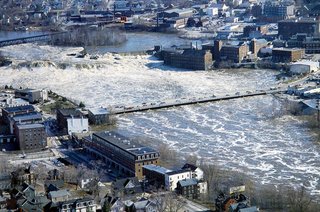Taxes in Maine: Impressions After My First Full Tax Year
 When I was living those many years in MA and NH, I would often hear from my family how bad the taxes were in the state of Maine. When I was in NH, anything was probably worse (in the Tax Foundation 2007 report NH ranked 49th in overall taxes paid, above only Alaska). When I was in MA (in the Tax Foundation 2007 report ranked 28th in overall tax rate), which has had the nickname "Taxachusetts" for as long as I can remember, I remember thinking "How bad could they really be?"
When I was living those many years in MA and NH, I would often hear from my family how bad the taxes were in the state of Maine. When I was in NH, anything was probably worse (in the Tax Foundation 2007 report NH ranked 49th in overall taxes paid, above only Alaska). When I was in MA (in the Tax Foundation 2007 report ranked 28th in overall tax rate), which has had the nickname "Taxachusetts" for as long as I can remember, I remember thinking "How bad could they really be?"Well after my first full tax year here, I can say the the overall tax burden here is not good. In the last report, Maine ranked right near the top, under only Vermont in overall tax rate. Think about that for a second. When I moved here from MA, my personal tax rate jumped over 3%. I don't own any property, so I can't speak on property taxes, but I think they are lower overall than those of say NH and MA. Car excise tax was roughly what I was paying in MA and NH, though it seemed to drop off quicker in Belmont, where I lived before moving back to Maine.
Where Maine really seems to get you is in all the things you don't immediately think about. Things like the city of Lewiston's policy of taxing all of your business' physical assets (even computers, desks, chairs and bookshelves). Things like, at least if I understood my accountant correctly, a Workers Compensation "tax" cost of over $250 per employee per MONTH. The more you find out, the more you start to understand why in Maine, small, vacation oriented businesses rule, and larger businesses that can move elsewhere, do. On top of all this, Maine also has a ridiculous "use tax" (something I strongly oppose) which requires you to pay sales tax on anything you purchased out of state. So with all this additional tax burden, do we get more from our state?
Not that I can see. True, the roads tend to be a little better overall. Driving around the Cambridge/Belmont/Watertown area in my car was a nightmare of potholes at every turn, waiting to swallow up my low profile tires, and here, if I stay on the high traffic roads and away from the frost heaves I have less trouble. But as far as overall services, I don't see that we're better off.
Granted, I still think the overall costs can be lower here. Property and rent costs are much lower here, as is car insurance (I saved 50% on my rent and car insurance when I moved here), but it depends somewhat on where you live too. Moving to Portland, a really nice little city, wouldn't have saved me nearly as much, if anything at all. But it all does really have me rethinking actually building a business here, not without major incentives from the city, or state.
But what REALLY kills me is that in every election, there are promises of "tax reform" and "tax easement" but to look at the numbers, you see that this is a total crock. Maine has had a top 5 overall tax rate 19 out of the last 20 years, actually ranking #1 for 5 straight years in the years 1997-2001.
Reading the report makes me wonder how MA got the "Taxachusetts" nickname in the first place. They have ranked no higher than 17th (in 1991) in overall tax burden in the last 20 years.
All tax burden data from Tax Foundation.







